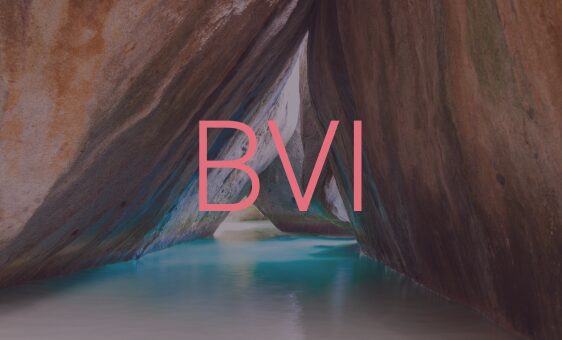A 2017 report by Capital Economics examining the BVI’s contribution to the world economy noted that the assets held by BVI business companies had an estimated worldwide value of USD1.5 trillion.
Recent developments
Economic growth in the BVI is estimated to have contracted in 2017, due in part to the impact of unprecedented weather incidents. Over the period 7 August to 19 September 2017, BVI was affected by severe flooding and hurricanes of category four and five intensity. The most destructive of
the three events; Hurricane Irma, caused widespread and catastrophic damage to the territory on 6 September. This was followed by Hurricane Maria on 19 September. Damage from the two hurricanes is estimated to have exceeded USD3.6 billion, equivalent to approximately 3.5 times the annual gross domestic product of the BVI. The decline in economic activity, particularly in the last quarter of 2017, is expected to have weakened the government’s fiscal and debt positions.
Nevertheless the outlook for the BVI remains prudently optimistic. Notably, the Financial Services Commission (FSC) and professional services firms were able to continue providing key financial and related services throughout the hurricane season with minimal disruption and reported activity levels were on a par with those of 2016. Economic activity will now be driven primarily by the financial services sector and by construction activity related to rehabilitation and reconstruction. Tourism is expected to recover slowly as more accommodation becomes available by the beginning of the tourist season in November 2018.
Repairs to property will support the tourism sector as the territory continues to rebuild. The restoration of electricity at the end of March 2018 has also supported the reopening of small businesses as the territory returns to a state of normalcy. Growth is expected to average 3% over the next three years before returning to the long-term average growth of 1%.
The pace of recovery in the BVI will depend on the government’s ability to restore damaged infrastructure, how quickly the private sector is able to replace lost assets and resume regular business operations and the rate at which households are able to reconstruct damaged homes and replace personal assets.
Additional pressure is likely to be placed on the fiscal and debt positions as the government is expected to borrow heavily for the recovery and redevelopment of the territory. Preliminary projections for 2018 anticipate lower revenues, due in part to lower collections from the accommodation sector, lower taxes on international trade due to the import duty exemptions, and lower payroll taxes. Expenditure levels will be elevated in 2018 and in the short term, primarily due to higher capital expenditures for the recovery and redevelopment programme.
Downside risks are related to a fallout from the financial sector as the European Union proposes to make a decision on its blacklisting of BVI by the end of 2018 (the European Council placed the BVI on the grey list in March 2018 following a review of jurisdictions hit by the 2017 hurricanes).
In addition, the UK Parliament’s decision that British Overseas Territories are to adopt public registers of Beneficial Ownership of companies by 2020 is likely to result in a fall of BVI government revenues by a reduction in the number of active BVI business companies.
Capacity constraints are also expected to hamper the recovery process, as the demand for skilled labour around the region heightens due to elevated levels of post-hurricane rehabilitation and construction. Any additional weather- related shocks in 2018 could also derail recovery efforts.
The BVI was an early adopter of the Common Reporting Standard, an information standard for the automatic global exchange of tax and financial information mandated by the Organisation for Economic Co-operation and Development (OECD). BVI implemented it domestically on 1 January 2016 for reporting submissions commencing in 2017.
The OECD’s other major regulatory scheme, Base Erosion and Profit Sharing (BEPS), addresses tax avoidance strategies that exploit gaps and mismatches in tax rules to artificially shift profits to low or no-tax locations. Over 100 countries and jurisdictions are collaborating to implement the BEPS measures and tackle BEPS and in March 2017 the OECD updated the list of BEPS members to include the BVI.
The pace of this global regulatory change continues to put pressure on the BVI’s finance industry and increase compliance costs, while technological change is driving innovation that will lower costs and fundamentally change business models. Technological change will create opportunities; for example, helping customers to open BVI bank accounts more easily.
A new bank, Bank of Asia (BVI) was launched in April 2018. This brings the total number of banks licenced in the BVI to eight. Bank of Asia is a digital bank formed to address the growing needs of offshore companies, their owners and multinational conglomerates. The bank has been granted a restricted Class 1 Banking licence by the FSC which permits it to bank companies and individuals other than individuals who are resident in the BVI.
On 24 November 2017 the Micro Business Companies Act, 2017 was enacted. This new Act caters to micro businesses with an asset value or annual turnover of not more than USD 2 million (in any currency) with no more than 10 employees and that does not carry on regulated business.
On 11 January 2018, the much-anticipated Limited Partnership Act, 2017 (LP Act) came into force in BVI. The Act completely modernises the law with respect to limited partnerships in much the same way that the BVI Business Companies Act, 2004 modernised BVI’s corporate regime. While limited partnerships have been available in the BVI since 1996 under the Partnership Act, the legislation had not kept pace with commercial needs, making limited partnerships unattractive compared to the popular and functional BVI business company.
Attractions of the BVI
The BVI enjoys an excellent business infrastructure with good telecommunications. This, coupled with the widespread use of the English language and a legal system largely based on English law, makes the BVI a convenient and effective business base. The substantial numbers of offshore companies, trusts, insurers and mutual funds in the territory are supported by a well-developed and diverse professional services sector.
The BVI is one of the world’s largest centres for the incorporation of companies, especially those created to facilitate cross-border trade, investment and business.
A BVI Business Company requires few steps to incorporate, can be set up in a few days and the financial reporting burden is low. While this is also true for setting up a company in Delaware, the United Kingdom, Seychelles and the Bahamas, the BVI remains attractive and offers a number of advantages for investors, including:
Flexible and commercial company law
Since 2007, the BVI Business Companies Act, 2004 has been the leading corporate law legislation that governs and regulates This Act has been so successful it has been used as the basis for drafting numerous other jurisdictions’ company legislation. The BVI corporate regime is extremely flexible and provides owners of BVI business companies a great deal of latitude in creating business friendly bespoke constitutional arrangements.
Legal expertise rooted in English law
The BVI operates under an anglicised version of Delaware law, which is business Incorporating under ‘almost- English law’ gives high value in that it offers quality, confidence and stability. The wealth of English common law authority that is highly persuasive under BVI law creates invaluable jurisprudential resource. The BVI also has a sophisticated, high quality commercial court and international arbitration centre, with a final right of appeal to the Judicial Committee of the Privy Council in London.
Tax neutrality
The government of the BVI does not charge corporate tax or capital gains tax, whether or not a company is tax resident, and does not charge tax on transactions that relate to economic activity This does not reduce or eliminate any tax liability in other jurisdictions but means that when funds are pooled and repatriated across borders they are not subject to additional taxation to the tax payable by investors in their respective domiciles. The BVI does levy taxes on its residents however these are more indirect (i.e. consumption – import duties) rather than direct (e.g. corporate tax).
Political stability
The BVI provides security; assets can be kept protected from potential loss, damage or sequestration resulting from socio-political instability or delinquent legal, regulatory or enforcement institutions in other countries. The territory’s links with the United Kingdom increase investor confidence.
Client confidentiality protected by law
The BVI rules on confidentiality fall back on English common law In terms of transparency, the BVI has entered into tax information exchange agreements with numerous jurisdictions and will provide other jurisdictions with relevant information if requested and following prescribed protocols. In furtherance of this information exchange co-operation, on 30 June 2017, the Beneficial Ownership Secure Search System Act, 2017 (BOSS Act) was enacted. The Boss Act and the Beneficial Ownership Secure Search System (BOSS) creates a confidential platform on which beneficial ownership is accessible but it is not publicly available. Searches on BOSS will only be conducted by designated individuals of BVI authorities and only upon receipt of formal, vetted as proper and lawful requests from the UK Financial Intelligence Unit of the National Crime Agency.
The BVI is also a signatory to the CRS to effect financial reporting in keeping with agreed international standards.
The United States dollar is the territory’s only tender
Other international financial centres have their own currency, may suffer currency volatility and can invoke currency Such controls are not possible in the BVI given that its only tender is the US dollar.
Variety of acquisition structures
One of the biggest advantages of the BVI is the range of possible acquisition tools. There are four main methods of acquiring a BVI company: straightforward share or asset purchase or contractual offer, merger, consolidation, and scheme of arrangement.
Taking security under finance transactions
The BVI operates a dual public and private register of all security interests granted over the assets of BVI companies and limited Private notations of the granting of security interests over the ownership interests in BVI vehicles is also possible. Public registration of security interests is not mandatory however it determines the priority of the security interests. Accordingly, the certainty of priority and publication of security interests under BVI law means that it is often the jurisdiction of choice for lenders in finance transactions.
Business structures
BVI corporate law previously distinguished between local companies (permitted to operate in BVI’s domestic market) and foreign-controlled companies (restricted to international business). When the BVI Business Companies Act came into force on 1 January 2005, distinctions between local companies and foreign-controlled companies were removed with the introduction of a single class of company, the business company, which continues to enjoy the tax- exempt status enjoyed by the former BVI international business corporation.
That Act makes it possible to establish several different types of business companies in the BVI. The most popular type by far is a company limited by shares, which has limited liability and is authorised to issue shares. An unlimited company with unlimited liability or a company limited by guarantee may also be established, both of which can be created with or without authority to issue shares. In addition, it is possible to form a BVI company as a segregated portfolio company (SPC). SPCs create internal accounts (segregated portfolios), to which specific assets and liabilities may be attributed. These are legally separated from the assets and liabilities of the SPCs ordinary account (general assets) and also from the assets and liabilities attributed to any other segregated portfolio of the SPC. In each case, a company will be incorporated with constitutional documents comprised of a memorandum of association and articles of association.
While business companies are regularly used as investment fund structures or investment business companies because of BVI’s tax neutral regime, they are most commonly used as group holding companies, holding shares in one or more other companies, usually to minimise the amount of tax deductions, thereby increasing profit margins. They are also commonly used as trading companies and royalty companies (obtaining profits from intellectual property).
A business company may also be incorporated as a restricted purposes company with limited objects set out in its memorandum of association.
A foreign company incorporated outside the BVI may seek to establish its principal place of business in the BVI or, more usually, a branch office. BVI companies are allowed to open local and foreign accounts, own shares and other securities, freely transfer their assets in any form, enter into and complete transactions in any currency, and perform trading and investment activities. Subject to sanctions and other legal requirements, there are no restrictions on conducting business in any country of the world, except the BVI itself. A foreign company that wishes to “carry on business” in the BVI may do so with the permission of the Registrar of Corporate Affairs.
It is now also possible to register limited partnerships under the new LP Act, as well as general partnerships under the Partnership Act, 1996.
In addition, the simple business vehicle created for micro business under the Micro Business Companies Act, 2017 is available.
Investing in the BVI
To engage in a business, profession or trade in the BVI (as distinct from establishing an offshore trust or company) a trade licence is required under the Business, Professions and Trade Licences Act, 1989. This Act defines “business or trade” as “any operation of a commercial character by which a trader provides to customers for fee or reward any kind of goods or services”.
The application is submitted to the Department of Trade, Investment Promotion and Consumer Affairs and must be accompanied by the documents set out in the Department’s checklist.
In the case of BVI owned companies, the documentation must prove that at least 60% of the shareholders and at least 60% of the directors of the company are Virgin Islanders. On the issue of a licence, the applicant must pay the prescribed fee to the Accountant General and should then register the business with Inland Revenue, Social Security and National Health Insurance.
Economy
The GFCI is a barometer of the relative attractiveness of jurisdictions across the world, based on an international survey of finance sector professionals. The index combines factors such as office rents and transport infrastructure with the perceptions of finance professionals on the more volatile factors affecting the business environment.
In the latest edition of the index, from March 2018, the BVI is described as an ‘International Specialist’ and is currently ranked 60th out of a total of 96 rated financial centres. The closest offshore locations are the Bahamas (59th) and Gibraltar (66th).
Currency strength
The currency of the British Virgin Islands has been the US dollar since 1962, although banks maintain accounts in sterling as well. There are no exchange controls.
Inflation rates
BVI’s economy is estimated to have contracted by 2.7% in 2017, following a decline of 2.2% in 2016. At the end of December 2017, inflation was estimated at 1.2% representing a slight increase in the consumer price index.
Main trade sectors
The two mainstays of the BVI economy are offshore financial operations and tourism. Minor industries include fishing, rum distilling and construction. Exports include fish, rum, sand and gravel, fruits and vegetables. Livestock raising is the most important agricultural activity; poor soils limit the BVI’s ability to meet domestic food requirements. The economy is closely tied to nearby Puerto Rico and the US Virgin Islands. Tourism accounts for an estimated 45% of GDP. BVI is also an established centre for the charter yacht industry.
In the mid-1980s, the government began offering offshore registration to companies wishing to incorporate in the BVI, and incorporation fees now generate substantial revenues with financial services as a whole now contributing over half of government revenues.
Local specialist and expert firms help service the often complex needs of those looking to carry out cross-border trade and investment. This cluster of corporate service providers, professional services firms (especially legal, corporate services, insolvency and accountancy practices), banks and insurers, plus specialist government and regulatory authorities, comprise the BVI’s ‘international business and finance centre’. Services are provided to clients across corporate business, trust and estate planning, captive insurance, investment funds and ship and aircraft registration.
The BVI is one of the world’s largest centres for the incorporation of companies; especially those created to facilitate cross-border trade, investment and business. The Financial Services Commission notes there are currently over 389,000 active companies on the Register as at Q4 2017. This puts the BVI considerably ahead of most other offshore jurisdictions; the Cayman Islands, for example, has approximately a quarter of that number of active companies.
Current Opportunities and Future Prospects
The BVI’s economy is highly dependent on external factors, and economic performance remains sensitive to developments on the international stage. Thanks to investment in the pier expansion, cruise tourism numbers have increased significantly in the last two years, returning to levels seen prior to the global economic crisis. A planned expansion of the T.B. Lettsome International Airport runway would encourage more overnight visitors.
In the financial services industry, both company incorporations and revenues have decreased, partly due to unwarranted negative attention following the “Panama Papers” leak early in 2016. The BVI is currently taking concerted measures to maintain quality and add value to the financial services sector.
Given the importance of these two sectors for both the economy and government revenues, the government has set out a fiscal strategy for the medium term that involves reviewing revenue generating initiatives, encouraging expenditure efficiency, addressing contingent liabilities, building reserves and maintaining borrowing ratios.
Legal System
The Constitution forms the foundation of the BVI’s legal system. As a UK overseas territory, the BVI is governed by a Legislature comprised of the Queen and the House of Assembly, which is made up of 13 elected members, the Speaker and the Attorney General. The Cabinet is comprised of the Governor, appointed by the British Crown, and Ministers, including the Premier, who are elected by the members of the House of Assembly and the Attorney General. When he is present, the Governor chairs Cabinet meetings.
While the BVI has an independent legal and judicial system based on English common law, the UK, acting through the Governor, is responsible for external affairs, defence and the armed forces, internal security and the police, the terms and conditions of service of persons holding or acting in public offices, and the administration of the courts.
Although the UK Government has the residual power to pass legislation affecting the BVI, it is rarely used, with the recent exception of imposing public registers of beneficial ownership of companies by 2020, pursuant to the UK sanctions and Anti-Money Laundering Act 2018.
The Legislature legislate local matters such as laws dealing with banking, companies, partnerships, trusts, insolvency, insurance, civil procedures and taxation, often consulting the private sector on proposed new legislation. On a regular basis the UK extends, by way of Orders in Council to the BVI, international sanctions imposed by the European Union or the United Nations.
In practice, the BVI’s legal system has not diverged much from that of England and Wales because of the continued constitutional relationship with the UK. Furthermore, the territory’s statute law largely follows UK legislation and being a small jurisdiction, the number of decided cases creates relatively little opportunity to develop local jurisprudence, so decisions of the English courts are frequently followed.
The BVI is a member of the Eastern Caribbean Supreme Court, which provides the High Court (also known as the Supreme Court) and the Court of Appeal. The High Court has a specialised Commercial Court that deals with claims having a value of at least USD 500,000. While the High Court and the Commercial division sit in the BVI, the Court of Appeal’s sittings rotate through the states of its members. The BVI also has a Magistrate’s Court. Appeals from the Magistrate’s Court or the High Court, including the Commercial division, are heard by the Court of Appeal, while appeals from the latter are heard by the Judicial Committee of the Privy Council in London.
Foreign Investment Restrictions
Regulatory environment
BVI welcomes foreign direct investment and the government offers a range of incentive packages aimed at reducing the cost of doing business. These include relief from corporate tax payments over specific periods, although companies must pay an initial registration fee and an annual license fee to the FSC. Crown land grants are not available to non-Virgin Islanders, but private land can be leased or purchased following the approval of a Non-Belonger Land Holding License. Stamp duty is imposed on the transfer of real estate and the transfer of shares in a BVI company owning real estate in the BVI at a rate of 4% for “belongers” and 12% for “non-belongers”.
There is no corporate income tax, capital gains tax, branch tax, or withholding tax for companies incorporated under the BVI Business Companies Act. Payroll tax is imposed on every employer and self-employed person who conducts business in the BVI at a rate of between 10% to 14% and on each employee at a rate of 8%.
Incorporation or registration
Usually a person or entity seeking to establish a business in the BVI will incorporate a business company as the legal person that will conduct business in the territory. A BVI company must have a registered agent and registered office in the BVI and, once incorporated, pay a modest annual government licence fee, calculated by the number of shares that the BVI company is authorised to issue; USD450 p.a. for a standard company authorised to issue up to 50,000 shares and USD1,200 p.a. to issue more than 50,000 shares.
In some circumstances however a company incorporated outside of the BVI may choose to do business in the BVI without establishing a BVI company. A foreign company may only “carry on business” in the BVI if it has first obtained the permission of the Registrar. Once permission is granted, the foreign company details are included in the BVI Register of Foreign Companies.
Work permits
A work permit must be obtained for any expatriate who wishes to engage in employment in the BVI, whether it is paid or unpaid, full-time or part-time. Employers must advertise any position in a local newspaper in the BVI for two consecutive weeks and give preference to any “belonger” or Virgin Islander who has applied and is qualified for the position.
Professional or trade license
In order to engage in any business, profession or trade in the BVI, as distinct from establishing an offshore trust, limited partnership or company, all persons and companies must obtain a license under the Business, Professions and Trade Licences Act, 1989.
Commercial property
In order for a non-belonger company (i.e. a company in which any one of its directors is a non-belonger) to purchase land in the BVI for the purpose of conducting business, it is necessary to obtain a Non-Belonger Land Holding Licence.
If a non-belonger company is renting office space in the BVI on an annual tenancy basis, a licence is not required.
Taxation
The BVI does not levy income taxes or any capital gains, capital transfer, inheritance or estate taxes or death duties and it does not levy tax on transactions that relate to economic activity elsewhere.
The principal taxes that apply to businesses and their employees in the BVI are payroll tax, national health insurance levy and a social security levy. Other sources of revenue for the government are import duties, company registration and annual fees, license fees and stamp duties.
Direct investment
The government is generally supportive of investment in a range of activities, and tax holidays and import duty exemptions apply in certain sectors and activities. In particular investment is encouraged in industries including food processing, tourist-oriented manufacturing, film production, beverage production, yachting services, and most recently, e-commerce.
The BVI has witnessed a stunning flurry of recent investment activity and interest in the FinTech sector. Certain of the leading FinTech companies such Bitfinex, Finamatrix and FootballCoin have incorporated BVI vehicles. An increasing number of initial coin offerings (ICO), initial token offerings (ITO), token generation events (TGE), crypto currency and crypto asset funds are being launched in the BVI. The FSC has communicated its willingness to work with FinTech start- ups and other innovators in a regulatory sandbox framework.
Foreign exchange controls and restrictions on foreign capital
There is no exchange control or restriction on the movement of funds into and out of the Territory or on their conversion into other currencies.
Top Tips for Investors
- Visit the BVI to ‘obtain on the ground’ experience of the jurisdiction and This will also assist in determining and appointing suitable professional service providers, opening a BVI account and identifying opportunities.
- If you are looking to incorporate a BVI business company or form a BVI limited partnership and time is of the essence, start collecting and preparing requisite “know your client” (KYC) “client due diligence” (CDD) documents and information to ensure there are no delays in establishing the BVI vehicle.
- If you have an existing company incorporated and operating in a jurisdiction other than the BVI and you want a BVI vehicle to continue those operations, consider continuation into the BVI. It is possible to re-domicile a non-BVI company or limited partnership (with separate legal personality) into the BVI by means of continuing that vehicle into the BVI. This means that any existing investment track record or contractual arrangements continue, without any disruption. The process of continuation is a relatively simple one, provided that continuation is permitted in the jurisdiction where the vehicle is currently established.
- When travelling into the BVI, consider flying into St Thomas, US Virgin Islands and then getting a ferry to Tortola, St Thomas airport is a bigger transport hub than the BVI airport and therefore provides more travel options at better prices.
- Consider to what extent you will need the support of a BVI registered agent or corporate services provider and let that guide you as to which provider is suited to your needs.
The Country Risk Report for BVI, written prior to the 2017 hurricanes makes the following observations:
Economic Risk: Low
Tourism is expected to expand due to a marginally improving U.S. economy, from where the majority of tourists originate. The country’s airport expansion project should also support growth however tourism is subject to external shocks, which exposes the economy to risk.
- Additional efforts to improve infrastructure and education have been initiated and should support long term growth goals.
- The United Kingdom is also a major trading partner and source of tourist for the Brexit could have material implications given the uncertainty of its spillover effects.
Political Risk: Low
- Seeking to further support the financial services industry, the government formed a public-private partnership with BVI Finance Limited and created an investment promotion agency.
- Changes were made to the country’s labour code and Immigration and Passport Act to be more conducive to business interests.
- The government is also committed to decreasing the islands’ crime rate. It has increased funding for the police force and has hired additional criminal investigators.
Financial System Risk: Low
- The Virgin Islands Deposit Insurance Act, 2016, enacted in June 2016, ensures that depositors who cannot assess the risks of the banks into which they are depositing will be insured against loss of deposits.
- To assuage investor doubts over financial transparency, the country is implementing Common Reporting Standards, providing additional reports to the Auditor General, and joining the OECD’s Inclusive Framework on Base Erosion and Profit Shifting. These efforts could mitigate the loss of correspondent banking relationships.
- The banking sector maintains sufficient levels of liquidity and is well capitalised.


























